|
|
|
Sort Order |
|
|
|
Items / Page
|
|
|
|
|
|
|
| Srl | Item |
| 1 |
ID:
101848
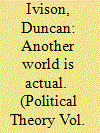

|
|
|
|
|
| Publication |
2011.
|
| Summary/Abstract |
There have been two distinctive aspects to James Tully's approach to the study
of imperialism over the years, and both are put to work in these remarkable
volumes.
1
The first is his belief in two seemingly contradictory claims: (i) that
imperialism is much more pervasive than usually thought (conceptually, historically and practically); and yet (ii) that there are many more forms of resistance to it than usually appreciated. The second is the way Tully places the
situation of indigenous peoples at the heart of his analysis. This goes back to
his groundbreaking work on Locke, and his extraordinary re-interpretation of
Locke's work in the context of early modern discourses of imperialism. But the
situation of indigenous peoples also deeply informed his argument in Strange
Multiplicity
2
-and not only in terms of the central motif of the lectures provided by Haida artist Bill Reid. In that book, he sought to reveal and defend a
much richer conception of legal and cultural pluralism than had hitherto been
appreciated by liberal constitutionalists and their critics. Indigenous peoples
are not simply a litmus test for our thinking about pluralism but represent a
much deeper challenge to the way we conceptualize notions of citizenship,
sovereignty, democracy and freedom in the first place-and indeed the nature
of political philosophy itsel.
|
|
|
|
|
|
|
|
|
|
|
|
|
|
|
|
| 2 |
ID:
080703
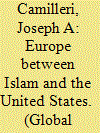

|
|
|
|
|
| Publication |
2008.
|
| Summary/Abstract |
Europe and its leaders, though they may not fully comprehend the significance of the events that are rapidly unfolding, and whether they like it or not, are key players in the historical process that will shape the geopolitics of the Middle East and Islam's response to the challenge of modernity. This is not say that Europe has it in its power to determine the choices that Iran and the Arab world will make, nor indeed should it attempt to do so. On the other hand, it does have a margin of manoeuvre which, depending on the way it is exercised, may tilt the balance in favour either of the politics of coexistence and cooperation or the politics of confrontation. European choices and capacities will revolve around four questions: How will European policies and attitudes position themselves vis- -vis the Orientalist tendencies of the past? What steps might be taken to clear the backlog of unresolved geopolitical tensions and misunderstandings? Can Europe develop a programmatic approach to regional and international governance which accepts cultural plurality as its foundation stone, even if this should create tensions in the transatlantic relationship? Is Europe disposed to forge a new social compact that accepts Muslims in Europe as European citizens fully engaged in the task of European construction? The article argues that these are not four unrelated questions, each with its own separate logic and modus operandi, but four mutually constitutive policydilemmas that will in large measure reflect and in part shape European efforts to fashion a new identityand sense of place in the world
|
|
|
|
|
|
|
|
|
|
|
|
|
|
|
|
| 3 |
ID:
117908
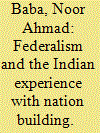

|
|
|
|
|
| Publication |
2011.
|
| Summary/Abstract |
For plural societies like India, the only workable strategy of nation building is to provide all segments of society with an equal sense of belonging, respect and security. The Indian constitutional framework, despite some assimilationist influences, was broadly drawn on accommodationist lines. As a matter of policy, India adopted cultural pluralism rather than an assimilationist brand of cultural nationalism. The Constitution allowed federalism to develop and evolve as a dynamic process, despite certain inbuilt limitations that undermined its functioning in its initial three decades. Nevertheless, there has never been a consensus in India about using special provisions/autonomy as a strategy of nation building or as a mechanism of problem solving. Such an arrangement in the context of Kashmir was seen as an aberration and a potential source of disunity for the country. However, the erosion of Article 370 has undermined rather than promoted the cause of national integration in relation to Kashmir.
|
|
|
|
|
|
|
|
|
|
|
|
|
|
|
|
| 4 |
ID:
188652
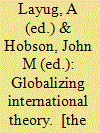

|
|
|
|
|
| Publication |
Oxon, Routledge, 2023.
|
| Description |
xiii, 263p.pbk
|
| Series |
Worlding beyond the West
|
| Standard Number |
9781032281834
|
|
|
|
|
|
|
|
|
|
|
|
Copies: C:1/I:0,R:0,Q:0
Circulation
| Accession# | Call# | Current Location | Status | Policy | Location |
| 060292 | 327.101/LAY 060292 | Main | On Shelf | General | |
|
|
|
|
| 5 |
ID:
134338
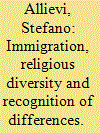

|
|
|
|
|
| Summary/Abstract |
Migration entails, among other consequences, the presence of different cultures and religions. Italy, being a latecomer among immigration countries, has had specific difficulties in acknowledging the new cultural and religious pluralism brought by migrations, due to lack of knowledge and reflection in this sphere. In the more recent context of social and cultural change in Europe, Italian society is also going through a phase characterised by reactive identities and cultural conflicts. They are producing a diffused anti-multiculturalist opinion, even though multiculturalist policies have not been openly implemented. Thus, on the one hand, this situation has so far prevented a real recognition of cultural and religious differences, particularly concerning Islam. But on the other hand, positive actions in favour of migrants can also be observed especially at the local level.
|
|
|
|
|
|
|
|
|
|
|
|
|
|
|
|
| 6 |
ID:
106592
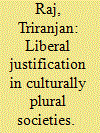

|
|
|
| 7 |
ID:
193629
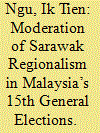

|
|
|
|
|
| Summary/Abstract |
Compared to Sarawak state elections, in the 2022 general election (GE15) the incumbent Sarawak Parties Alliance (Gabungan Parti Sarawak, GPS) and Sarawak-based opposition parties’ campaigns demonstrated a tendency toward a moderate rather than radical autonomy discourse. In GE15, these candidates attempted to reconcile their regionalism with nationalism to stay relevant in the national political landscape. Meanwhile, opposition parties performed better in certain Chinese- and Dayak-majority seats, exposing the limits of the Sarawak autonomy discourse. To explain these patterns, this article locates Sarawak against the backdrop of a centralized Malaysian federal government to clarify the salience of both structural and cultural factors in shaping autonomy claims. It shows the importance of inclusive and democratic institutions, like a general election, in integrating peripheral communities and checking radical regionalism. Further, preceding the general election, the readiness of the federal government to delegate power to the state government effectively secured the state ruling elite’s commitment to remain in the national government. However, institutional decentralization is insufficient to calm autonomy claims, as cultural pluralism increasingly underpins Sarawak regionalism. Sarawak’s autonomy discourse will not fade away and could radicalize again if the central government holds to exclusive ethnoreligious nationalism.
|
|
|
|
|
|
|
|
|
|
|
|
|
|
|
|
| 8 |
ID:
072194
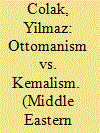

|
|
|
| 9 |
ID:
117458
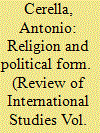

|
|
|
|
|
| Publication |
2012.
|
| Summary/Abstract |
Jürgen Habermas's post-secular account is rapidly attracting attention in many fields as a theoretical framework through which to reconsider the role of religion in contemporary societies. This work seeks to go beyond Habermas's conceptualisation by placing the post-secular discourse within a broader genealogy of the relationships between space, religion, and politics. Drawing on the work of Carl Schmitt, the aim of this article is to contrast the artificial separation between private and public, religious and secular, state and church, and the logic of inclusion/exclusion on which modernity was established. Revisiting this genealogy is also crucial to illustrating, in light of Schmitt's political theory, the problems underlying Habermas's proposal, emphasising its hidden homogenising and universalist logic in an attempt to offer an alternative reflection on the contribution of religious and cultural pluralism within Western democracies.
|
|
|
|
|
|
|
|
|
|
|
|
|
|
|
|
|
|
|
|
|